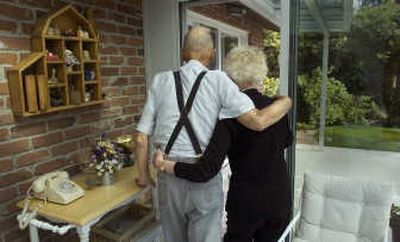Supporting the Caregiver

Friends told Jean Baxter they thought of her during a recent flight, when instructions came to “secure your oxygen mask first, before assisting someone else.”
Baxter, a retired nurse from Spokane, is the primary caregiver for her husband, Dr. Chad Baxter, who suffers from liver cancer. But she must remember to take care of herself, too.
“You’re no good if you’re not able to give the care,” Jean Baxter says. “I watch my food intake, and if I get tired, there are some days when I don’t do a whole lot of extra work.”
An estimated 44 million Americans provide care for ill, elderly or disabled family members or other loved ones, according to government statistics. And that number is expected to climb as the population ages and people live longer with chronic illnesses.
The job of caregiver can be exhausting, frustrating and lonely. Research done at Harvard Medical School and the University of Pennsylvania found that having a seriously ill spouse greatly increased the other spouse’s risk of death.
And a study out last month revealed the importance of training for family members caring for loved ones with Alzheimer’s disease. But the research showed that those caregivers were simply too busy and stressed-out to even attend such sessions.
“They are always, 24 hours a day, surrounded by the disease,” says Joel Loiacono, executive director of the Alzheimer’s Association Inland Northwest chapter. “They are on call 24 hours a day. They’re having to cope with all of the challenges that come with a particular disease, bathing a person, dressing a person, toileting a person … It is both a physical demand and a mental demand.”
Jack French spent years caring for his wife, Mae, as she became increasingly forgetful, confused and argumentative. She died nearly three years ago of Alzheimer’s. French made the difficult decision to place her in an adult-family home for the last several years of her life.
“It becomes so stressful at certain points that you feel you can’t handle it,” says French, who volunteers with the Alzheimer’s Association. “There were times I would get in the hallway of my house and actually scream to relieve the tension.”
He recommends that caregivers find ways to take breaks and seek support of others going through the same thing.
Later this month, Hospice of Spokane will begin a series of five free classes for caregivers. The sessions are open to anyone, regardless of affiliation with Hospice. The classes will discuss how caregivers can care for themselves, how to handle legal and medical issues, and how to communicate with friends and family, among other topics.
Gina Drummond, Hospice CEO, hopes the sessions foster “networking amongst them and support to know they’re not alone.”
Knowing that others are in the same situation and have answers to their questions is paramount for caregivers, says Gary Barg, who runs a magazine, Web site and conference series for caregivers.
“The real thing to do is not isolate yourself,” says Barg, founder and editor of Florida-based Today’s Caregiver and caregiver. “For every caregiver out there going to support groups and events and getting respite, there’s probably 100 thinking they’re all alone.”
First, people need to identify themselves as a caregiver, sometimes a difficult task, he says.
Some people think, “I’m not a caregiver. I’m just a loving daughter,” Barg says. “Now, what you need to do is become a member of their professional-care team.”
Finding time to attend a support group or a caregiver conference can help people deal with the conflicted feelings that arise. Caregivers may feel guilty taking a much-need break or shameful for choosing a residential-care facility for their loved one.
“The emotions caregivers don’t deserve to deal with … shame, guilt, embarrassment, fear,” Barg says. “That’s so much a part of our life as caregivers.”
It’s OK to ask for help, too. Take people up on their offers to run errands or stay with your loved one while you attend a support-group meeting, Loiacono says.
“The thing that amazes me is that, in our region, somebody needs help and everybody will drop everything and go help that person,” he says. “This community is great about that, but when it comes time at receiving help from others, we are the worst.”
Loiacono says he has seen many cases where the caregiver dies before the person receiving care.
“With most of these diseases, you’ve got a tiger by the tail,” he says. “If you try to wrestle this tiger by yourself, you’re going to get eaten alive.”
Dr. Chad Baxter, who retired 20 years ago, was one of Spokane’s first pediatric surgeons. He believes he contracted hepatitis B from an infected patient while inserting an intravenous line. That disease has now progressed to liver cancer and he recently became a Hospice patient.
“I just don’t have any energy and I’ve lost 20 pounds,” he says. His wife works hard to find foods he can stomach and keeps up with all of the household chores.
“She’s called ‘super wife,’ ” Dr. Baxter says.
Jean Baxter says she is glad to have the support of family and, now, Hospice for help. She has requested a wheelchair and a handicapped parking sticker, along with pain medications.
“We try to make his day as comfortable as possible, by not overwhelming him with things he has to do,” she says. “I’ve been caring for him for 56 years, so this is not something new and different.”